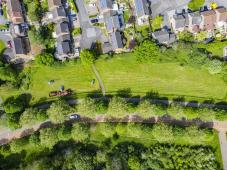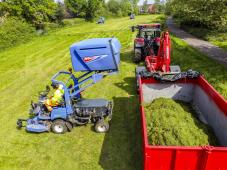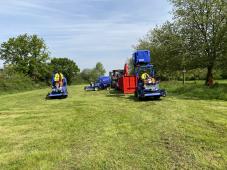Live Labs 2 blog – update from South Gloucestershire: Greenprint - delivering innovation at the cutting edge
This month our Live Labs 2 blog comes from Chris Harris, lead officer for Greenprint, South Gloucestershire Council’s green carbon laboratory project, exploring the potential in non-operational highways ‘green’ assets.
As we move into the second year of our Live Labs 2 project, we have been reflecting on our journey so far and plotting the steps we need to take next. Sometimes it helps to crunch the numbers on multi-layered projects like those in the Live Labs 2 initiative, so we’ve provided a breakdown. In 2023/24, we’ve:
- Signed up six project partner organisations to the project, including two universities and two industry partners to process the grass cuttings.
- Had 20 samples of grass and soil analysed for routine waste characterisation and persistent organic pollutants.
- Identified 24 sites for biodiversity monitoring.
- Cut and collected 85 hectares of grass - equivalent to around 140 football pitches.
Can’t see the wood for the trees?
For us, it’s all about the grass. The programme’s collaboration with Arup (the Live Labs 2 monitoring and evaluation consultant) has sharpened our focus on M&E and has helped us plan in greater depth and detail for the years ahead. Completing our Year 1 report was a crucial step in understanding the progress of our fast-paced, experimental project. It has allowed us to reflect on the highs and lows of a project that delivers innovation, challenges and opportunities for learning every single day.
The golden thread of decarbonisation
The programme’s joint monthly Live Labs 2 Technical Team meetings, together with the Expo event held in Birmingham in April, have helped us to better understand and contextualise our efforts. Although vastly different, the seven Live Labs projects offer valuable opportunities to collaborate, learn from one another and celebrate our achievements.
One example is the match making innovation meetings we are having with Wessex and Devon Live Labs about biochar applications. Whilst we all work within our own set of constraints, objectives and resources, the common theme of decarbonisation binds us all together.
Knowledge is power and sharing what we all know offers unlimited potential for positive change.
Year one highlights
The first year of the project saw a tremendous effort from staff at South Gloucestershire and West Sussex Councils. Working together with our project partners and contractors we laid the foundations to turn the Greenprint experiment into a reality. Crucial project management work has helped to establish solid working relationships internally and externally, as we transitioned from initiation to delivery.
Key achievements included an investment in specialist cut and collect equipment, extensive sampling and analysis work and the ongoing management of approximately 85 hectares of grass. By using analytical tools developed by the Future Highways Research Group, we have started to build a detailed assessment of the project's carbon baseline which will help us to evaluate the potential carbon impacts of our trials and experiments.
We’ve taken great strides in highway verges management, biomass technical innovation, economics and benefits evaluation, environmental impact assessment, and whole life cycle activities, with the on-going support of our academic and industry partners.
The project has generated positive media interest locally and nationally. Both West Sussex and South Gloucestershire councils issued press releases about the project and our work has featured in Highways Magazine. We’ve participated in several industry events, including Highways UK and LCRIG’s Innovation Festival, all of which provided a valuable opportunity to share what we are learning and encourage other organisations to engage with the work of the project.
All of our cutting crews have leaflets with information on Greenprint that they can hand out to people who come and talk to them, and local support has generally been very positive around the environmental impacts of the project.
Over the summer months, as the grass grows longer, local authorities tend to receive increased queries about cutting and maintenance of green spaces. Many of these are related to areas not included in Greenprint and consequently our team are developing interactive browser maps to make it easier to share information on specific locations with all stakeholders.
The future is bright green
Goals for Year 2 include scaling up our cut and collect operations and biomass transformation, allowing us to test the machinery and our processes in real conditions on an industrial scale.
The approval process from Ofgem, required to co-mingle cut grass with the Council’s domestic food waste stream for disposal via anaerobic digestion (AD) at the Geneco plant in Avonmouth, is still progressing. In the meantime, we are in discussions with a partner AD plant who have offered to receive the cuttings.
We will also be refining our environmental conservation strategies and engaging communities in sustainable practices for long-term viability. One of our key areas of focus will be on biomass processing trials, anaerobic digestion, hydrothermal carbonisation and pyrolysis as we work towards producing commercial-scale quantities of hydrocar and biochar for use in bitumen and aggregate applications such as road surfacing. Nothing gets lost in the process, we will measure other by-products such as biofuel and heat and analyse their viability in the operation cycle.
We also need to better understand the barriers to behaviour change towards a low carbon model of verge management, including how any resistance to change in local authority decision making can be understood and influenced.
We are looking forward to sharing our journey, sharing our innovation and research and supporting our Live Labs 2 colleagues.
Further information
- For more information on ADEPT Live Labs 2: Decarbonising Local Roads in the UK, please look at the Live Labs 2 section on the website
- For more information about this Live Labs Project, please visit South Gloucestershire Council and West Sussex County Council: Greenprint
- You can also visit the two project websites: beta.southglos.gov.uk and www.westsussex.gov.uk
- LinkedIn - South Gloucestershire Council
- LinkedIn - West Sussex County Council
Author
- Chris Harris is the lead officer for Greenprint, South Gloucestershire Council’s green carbon laboratory project.



